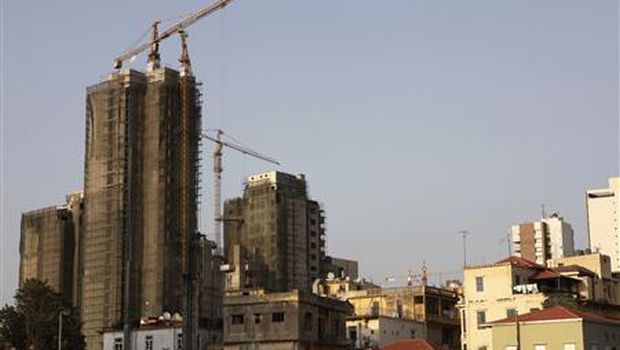
Cranes work on new tower blocks that dwarf traditional buildings in Beirut on July 12, 2010. (Reuters/Cynthia Karam)
Beirut, Asharq Al-Awsat—The real estate market in Lebanon is currently witnessing a slump, especially in the capital, Beirut, where sales have dropped significantly as rents soared as a result of the influx of Syrian refugees.
A recent study conducted by Lebanese real estate company Ramco showed that the real estate sector in Lebanon shrunk 2.6 percent in 2013, booking sales of 8.71 billion US dollars—down from 8.94 billion dollars in 2012—and recording 69,198 total transactions, a 7.2 percent drop from 74,569 in 2012.
The research also showed that 227 apartments constructed in Beirut in 2013 were left unsold, bringing the number of finished but unsold apartments in the city up 27 percent over 2012.
It said some of the major challenges faced by the real estate sector in Lebanon were the dearth in lands available for construction and investment, the relatively low demand from visitors from the Gulf, and the high cost of construction materials.
Lebanon real estate expert Suleiman Abi Haydar told Asharq Al-Awsat that situation had continued in 2014 and that the market was in its “worst state” since the previous year. He said demand had come to a virtual standstill in view of rising apartment and land prices, pointing out that “the price of one [square] meter of land in mountain areas was around 200 dollars, whereas in Beirut it can fetch as much as 4,000 dollars.”
The Ramco research showed that the average price of an apartment in Beirut ranged from 1,925–7,647 dollars per square meter depending on the building’s geographic location. Prices in central Beirut were even higher, with the average price in the area exceeding those of other regions in the city by 53 percent. In western Beirut, the average price for a 323-square-meter apartment is 994,320 dollars, but this rises to 2.63 million dollars for a similarly sized apartment in central Beirut.
But Raja Makarem, the chairman of Ramco, told Asharq Al-Awsat that while the research showed the real estate market in the country was indeed in the middle of a slump, particularly in regards to lower demand for apartments compared to land, there had been recent signs of a possible uptick.
He said: “While the number of finished unsold apartments is on the rise, there is still a high demand for land. In the past two weeks, there were also notable sales of large flats, something we see as a direct result of the new government reshuffle and the improved security situation.”
In terms of the rental market, Haydar pointed out the effect Syrians coming to Beirut to escape the conflict had had here, saying that “Syrian emigrants have impacted the entire sector and that [in Beirut] apartment rents have increased by 400–700 dollars per month.”
Speaking to Asharq Al-Awsat, economic expert Eli Yashoui believed there was little chance of the sector picking up soon in light of the situation caused by the conflict in neighboring Syria. “We expect the real estate [sector] and the economic situation in general to remain as it is as long as the Syrian crisis remains unsolved and the internal situation remains fragile and tense, whether politically or in terms of security,” he said.
There are now well over a million registered Syrian emigrants in Lebanon, 57 percent of whom live in either rented houses or apartments, according to recent figures from the UN.
The World Bank estimates that the Syrian conflict and the resultant influx of Syrian refugees will cost Lebanon some 7.5 billion dollars in cumulative losses by the end of 2014, cutting GDP growth 2.85 percent while doubling unemployment to above 20 percent and widening the country’s budget deficit by 2.6 billion dollars.
